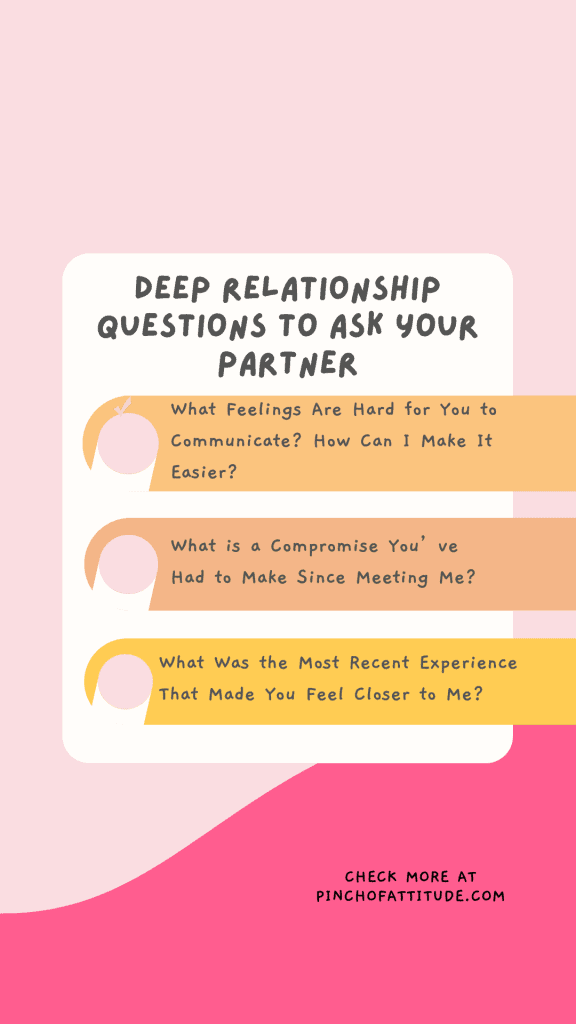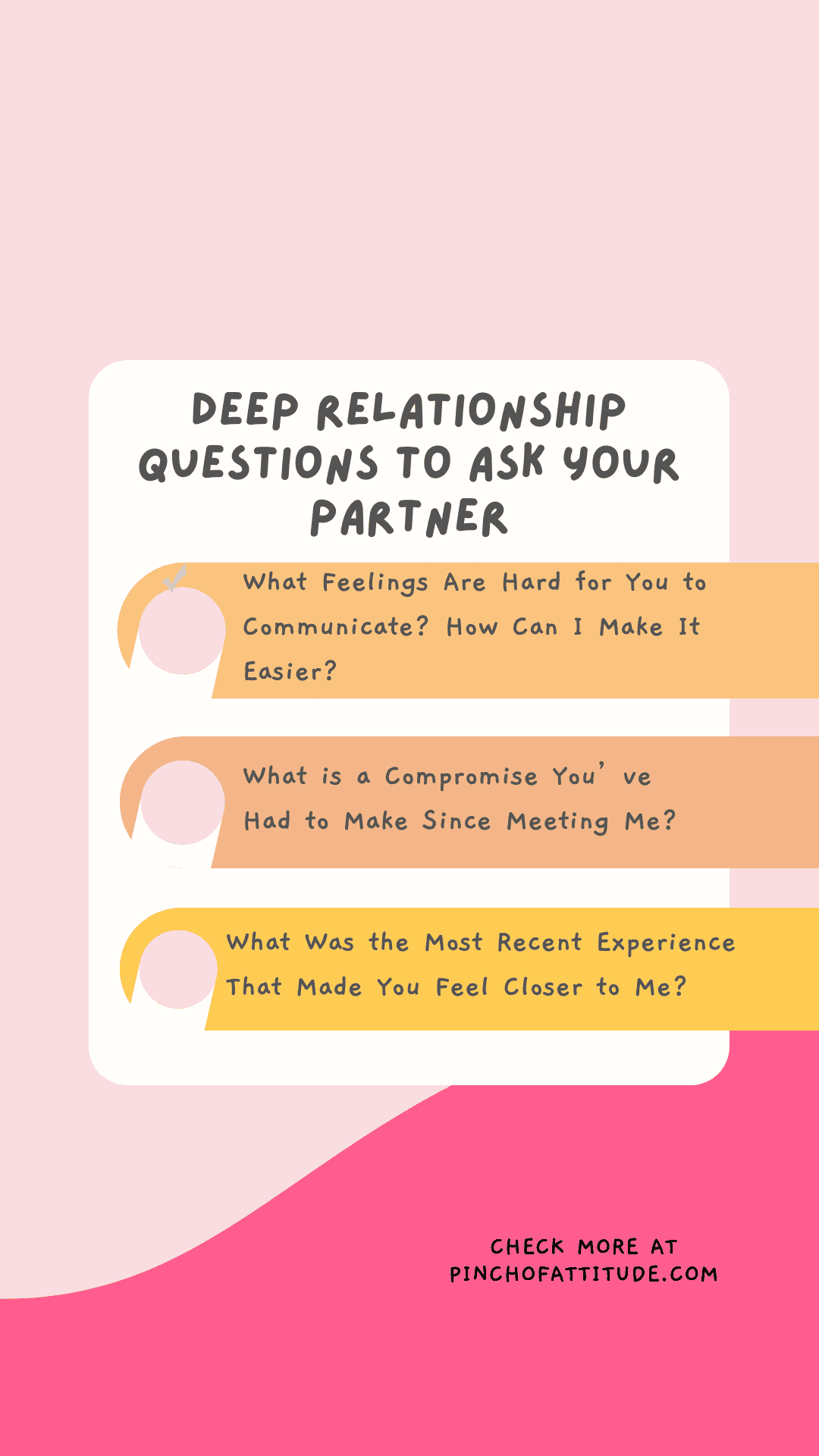Let’s get real, relationships aren’t all about roses and candlelit dinners. I wish someone would sell a perfect relationship manual so you and I can use it to overcome difficult stages in our relationships.
I know wishful thinking 🤪.
Ok! If you want a truly fulfilling connection with your partner, you’ve got to dig deep, I mean ask the tough questions that we all try to run away from.
Forget the small talk and let’s dive into the questions that matter.
- Real connection happens when you ask the tough questions and genuinely listen to the answers.
- Acknowledging the compromises you both make can prevent resentment and build appreciation.
- Reflecting on moments that brought you closer reinforces your bond and keeps the relationship fresh.
Table of Contents
1. What Feelings Are Hard for You to Communicate? How Can I Make It Easier?

Why It Matters:
Communication is more than just talking. It’s about baring your soul and not being afraid of the messy bits. Everyone’s got feelings they’re scared to let out, whether it’s fear of rejection or just not knowing how to put emotions into words. If you can figure out what your partner struggles to communicate, you’re halfway to a more honest and open relationship.
How to Approach It:
Here’s the thing: vulnerability isn’t a switch you can just flip on. Start by sharing your own struggles.
Open the door by saying, “Hey, sometimes I feel like an idiot when I’m trying to talk about my feelings. Does that ever happen to you?” Be a non-judgmental listener. Validate their feelings without trying to fix them immediately.
Example Discussion:
“I sometimes feel like a burden when I’m overwhelmed with work stress. It’s hard for me to talk about it because I don’t want to dump my problems on you. How can we create a space where we can both share these kinds of feelings without feeling guilty?”
2. What is a Compromise You’ve Had to Make Since Meeting Me?

Why It Matters:
Compromise isn’t a dirty word, it’s the currency of any relationship. But it’s easy to lose sight of the fact that both of you are making sacrifices to make things work. Acknowledging these compromises can bring a sense of balance and appreciation.
How to Approach It:
Approach this conversation with genuine curiosity and gratitude. Recognize the effort your partner has put into the relationship.
Say something like, “I really appreciate you adjusting your plans to spend time with me. Has there been anything you’ve had to give up that’s been particularly tough?”
Example Discussion:
“I know you’ve had to change your work routine to match my crazy schedule. I really appreciate that. Is there a way we can adjust things so it’s not too much of a hassle for you?”
3. What Was the Most Recent Experience That Made You Feel Closer to Me?
Why It Matters:
Remembering and sharing positive experiences can solidify your bond. It’s about reinforcing the idea that you’re both in this together and that these moments of closeness aren’t just flukes, they’re the backbone of your relationship.
How to Approach It:
Share your own recent moments of connection first. This sets the stage and makes your partner feel more comfortable opening up. Ask them to reflect on what made those moments special and how you can create more of them.
Example Discussion:
“I felt really connected to you during our weekend getaway when we just talked for hours without any distractions. What was a recent moment that made you feel closer to me?”
The Power of Deep Conversations

Now, let’s get into why these questions matter. Having these conversations isn’t just about the answers you get. It’s about the process of opening up and getting comfortable with the uncomfortable. It’s about showing your partner that you’re willing to go there with them to the places that are raw and real.
When you ask your partner about the feelings that are hard to communicate, you’re showing them that you care about their inner world, not just the surface stuff.
You’re telling them that it’s safe to share their fears and insecurities with you, and that’s huge. It builds trust, which is the foundation of any solid relationship.
Talking about compromises helps you understand the give and take of your relationship. It shows that you’re aware of the sacrifices being made and that you value them. This can prevent resentment from building up and help you find ways to support each other better.
Reflecting on positive experiences reinforces the good stuff in your relationship. It’s like hitting the refresh button on your connection.
When you talk about the moments that made you feel closer, you’re reminding each other why you’re together in the first place. It’s a way of celebrating your relationship and looking forward to more of those moments.
How Can You Make It Work For Your Situation?

Alright, so you’ve got the questions. But how do you actually have these conversations without them feeling forced or awkward?
Here are a few tips:
- Pick the Right Time: Don’t spring these questions on your partner when they’re stressed or distracted. Choose a moment when you’re both relaxed and have time to talk.
- Be Genuine: Approach these conversations with a genuine desire to understand and connect. If you’re just going through the motions, your partner will pick up on it.
- Listen More Than You Talk: This isn’t about you getting answers. It’s about creating a space for your partner to open up. Listen actively and validate their feelings.
- Follow-Up: After the conversation, follow up on what you talked about. If your partner mentioned something they struggle with, check in with them later and see how they’re doing. This shows that you were really listening and that you care.
Related Posts:
- 9 Questions To Ask About The Future Early In a Relationship (Stop Guessing)
- How I Start Tough Conversations with My Partner Without Sparking a War
- 12 Things You Should Know 12 Months Into Relationship
- 13 Must-Have Conversations Before You Say “I Do”
- Stop! Do Not Marry Until You Can Answer These Questions
Frequently Asked Questions
What is the importance of asking tough questions in a relationship?
Tough questions foster deeper connections and understanding between partners.
How can I help my partner communicate feelings that are hard for them to express?
Create a non-judgmental space and share your own struggles to encourage openness.
Why should we discuss the compromises made in our relationship?
Acknowledging compromises prevents resentment and builds appreciation for each other.
How does reflecting on positive experiences benefit our relationship?
Sharing positive moments reinforces your bond and reminds you why you’re together.
What is a good approach to having these deep conversations without awkwardness?
Choose a relaxed time, be genuine, listen actively, and follow up on the discussion.




